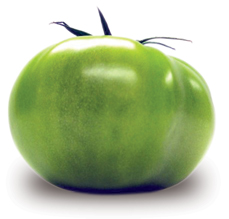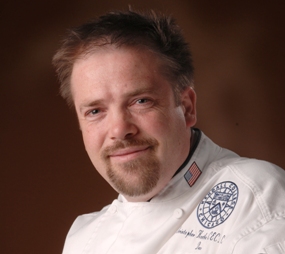Preparing Students to Change the World
31 May 2009By Christopher Koetke, CEC, CCE, Kendall College School of Culinary Arts
 10 ideas to encourage your students to make sustainability part of their careers.
10 ideas to encourage your students to make sustainability part of their careers.
As educators, our mission is to prepare future culinarians, not only for the foodservice landscape as it exists today, but as we expect it will be in the future. Trends come and go, but sustainability marks a paradigm shift in the way we will do business. The debate over the validity of climate change is over, and the challenge is staring us in the face.
But with great challenge comes great opportunity. Given its size and energy consumption, the foodservice industry can be the tipping point in preserving the world for future generations. To put it in perspective, there are approximately 945,000 restaurant locations operating in the United States. According to the National Restaurant Association Conserve: Solutions for Sustainability initiative. Those restaurants use five times more energy per square foot than other commercial buildings. Furthermore, with energy costs accounting for 30% of a typical building’s annual budget, it’s about financial sustainability, as well.

Since Kendall embarked on its sustainability journey in 2005, we’ve made some tremendous strides and weathered a few bumps along the way. More importantly, we have far to go because sustainability isn’t a destination; it’s a never-ending journey. We also know that, using our “philosophy of baby steps,” we can make a huge difference over time. You can, too.
There are a number of ways educators can approach sustainability in their programs, including sponsoring student clubs, adding electives or taking the leap to add it to the curriculum. At Kendall, we’ve chosen the latter because we believe this is “must have” knowledge for future culinarians. It is woven throughout every class and in every kitchen.
There are many aspects to sustainability, but we break it down into three primary areas: 1) operations, 2) food and 3) social aspects. We will eventually explore all three, but this article will take a more general approach. Following are a few ideas you can use to encourage your students to make sustainability part of their lives:
- Grab their attention with shocking statistics. The numbers are jaw-dropping! For example, did you know that a faucet dripping once per second can waste more than 3,000 gallons a year?
- Be the change you want to see. Students have a hyper-sensitive “hypocrisy radar,” so you need to walk the walk. More importantly, it’s a learning tool that helps build a sustainability mindset that students will take out into the world and employ as agents of change.
- Bring in the experts. Invite local representatives from your state restaurant association, organizations such as Chefs Collaborative and Slow Food, your utility company and your waste hauler.
- Employ critical thinking. Whether it’s a research report, debates or class discussion groups, get students excited and passionate about the mission.
- Study the effects. What are the costs involved with traditional practices? What is the net savings to both the bottom line and your carbon footprint if, for example, you do something as simple as adding low-flow aerators to your hand sinks?
- Take advantage of existing teaching resources. A number of organizations, such as Chefs Collaborative, have educational materials available. There is a great deal of activity happening in this area, and we’ll keep you abreast as new resources come online.
- Let students take the lead with research. Engage students in research to help you make operational decisions. How can you reduce disposables? If you must use disposables, which are the most sustainable and why?
- Make it a competitive sport. Establish a benchmark with something as simple as recycling. Track the volume of materials that are recycled each week and encourage students to break their record … again and again.
- Leverage the Internet. Our sidebar lists a few sites, but challenge your students to explore on their own. And yes, it’s even on YouTube, with posts from such credible sources as Yale University, Michael Pollan and Al Gore.
- Provide an introduction with Kendall’s “quick tips” video. It’s a great way to open the discussion, and a link is provided in the sidebar.
Finally, as you consider making sustainability part of your curriculum, don’t feel overwhelmed. There are many resources available. Remember: It’s all about baby steps. Perfection is the enemy of progress, so don’t be afraid to make mistakes. Learn from them and keep moving forward.
Sustainability resources on the Internet
General Information
- Earth 911
- Conservation International
- Environmental Defense Fund
- Al Gore’s Official Website
- Sierra Club
- Earth Pledge
- U.S. Composting Council
- U.S. Environmental Protection Agency
Foodservice Industry
- NRA Conserve
- Food Service Technology Center
- Chefs Collaborative
- Yale Sustainable Food Project
- Kendall College Video
- Yale Sustainable Food Video (20 minutes)
- Sustainable Farming – Curing America’s Eating Disorder (10 minutes)
- Fast Food World: Global Food Chain – Michael Pollan (56 minutes)
- The Slow Food Story (three parts of three to five minutes each):

Christopher Koetke, CEC, CCE, was recently named 2009 Cooking Teacher of the Year by the International Association of Culinary Professionals (IACP). He has presided as dean of Kendall College’s School of Culinary Arts in Chicago since 2005. One of his first leadership acts was to set the culinary-arts school on the path toward ecological sustainability. Today, sustainability is woven throughout the curriculum and guides the school’s operational practices. Kendall College’s two full-service dining operations—the elegant Dining Room and the casual Café—remain the only public restaurants operated by a culinary school and certified by the Boston-based Green Restaurant Association. CAFÉ is proud to announce its partnership with Kendall College to offer the first national “green” award for foodservice-education programs. The inaugural award will be presented at the 2009 Leadership Conference in Denver on June 11.
Additional Info
- CAFÉ Talks Podcast Lesson Plan: 1



